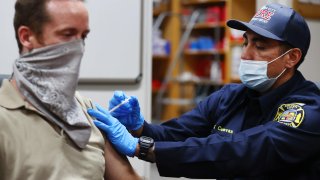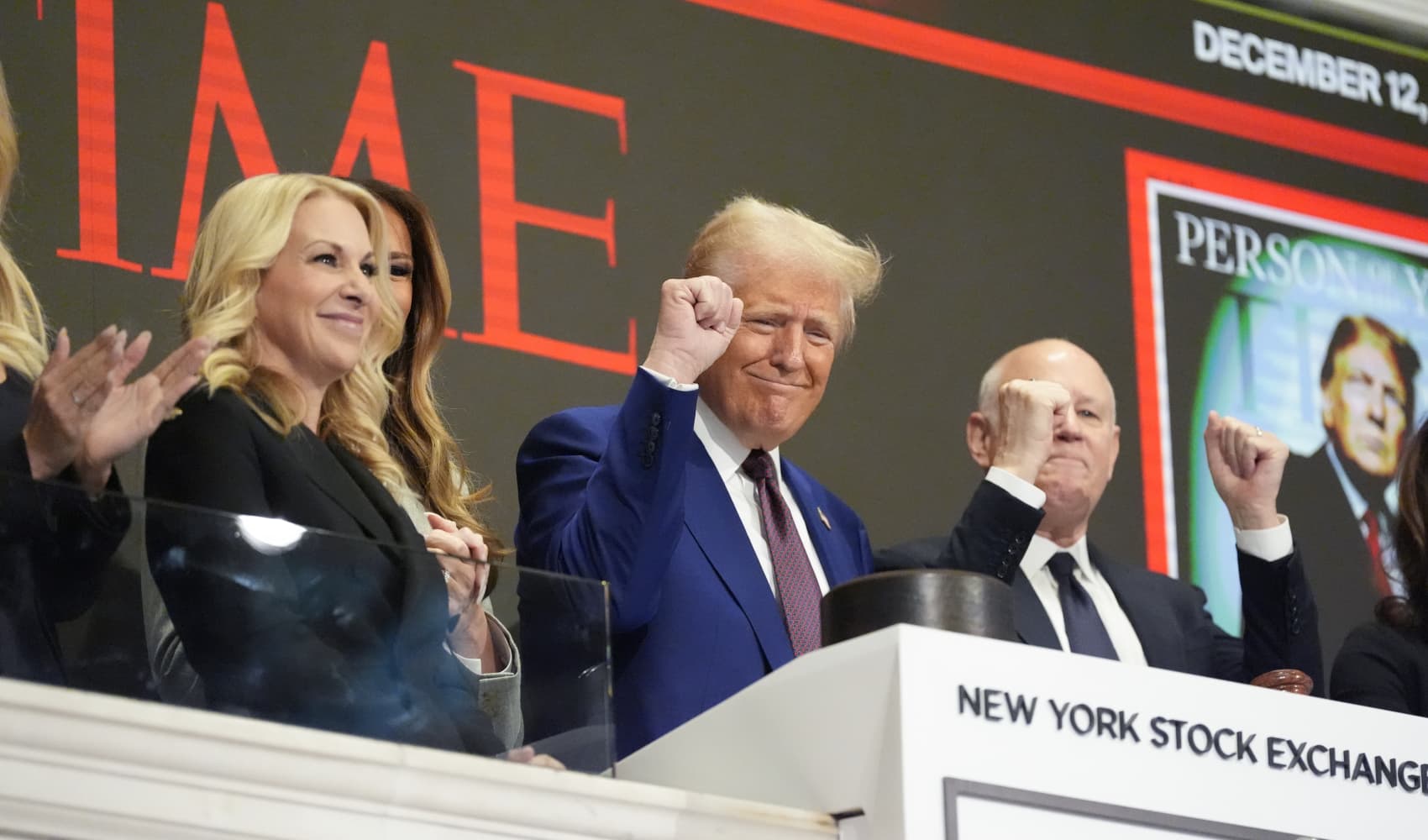
- The question of one's vaccination status is becoming increasingly relevant — and in an increasing number of cases — a condition of employment.
- Many people are now returning to the workplace following months of working from home.
- There are a growing number of jobs and sectors which are now requiring people to be fully vaccinated against Covid-19 — and not only in the more obvious public-facing roles.
As more and more people return to the workplace following months of working from home, the question of one's vaccination status is becoming increasingly relevant and, in an increasing number of cases, a condition of employment.
In both the U.S. and Europe there are a growing number of jobs and sectors which are now requiring people to be fully vaccinated against Covid-19 — not only in the more obvious public-facing roles like healthcare and education but also in the technology, hospitality, travel and finance sectors.
When Covid vaccine rollouts began in the U.S. and Europe around nine months ago, the majority of the workforce had to wait in line to receive a shot, with the elderly and healthcare workers prioritized.
But vaccinations in high-income countries have since become more accessible to all adults and employers have encouraged their staff to be immunized, both for their workers health and to get their businesses back to normal.
As vaccination drives roll out to the remaining sections of society that are not yet immunized — mainly adolescents — those adults that remain unvaccinated could find it increasingly difficult to return to work, or find employment in some sectors and companies.
Get Tri-state area news delivered to your inbox.> Sign up for NBC New York's News Headlines newsletter.
Less leeway on jobs
Money Report
The net closed in further on unvaccinated people last week with President Joe Biden warning that "patience is wearing thin" regarding the unvaccinated, particularly as U.S. Covid cases remain high as the highly infectious delta variant spreads.
In a significantly stricter tone, Biden outlined a plan last Thursday to boost Covid vaccination rates nationwide, pressuring private employers to immunize their workforce as well as mandating the shots for federal employees, contractors and health-care workers.
The share of job postings requiring vaccination has skyrocketed since the U.S. Food and Drug Administration granted full approval to the Pfizer-BioNTech vaccine on Aug. 23, according to jobs site Indeed, showing a growing trend among employers requiring candidates to be fully immunized.
"A few weeks ago, job postings on Indeed requiring vaccination started to take off and have accelerated since," AnnElizabeth Konkel, an economist at the Indeed Hiring Lab noted, adding that in the seven days through to Aug. 30, the share of postings per million specifically requiring vaccination against Covid rose 119% from the previous month.
Job postings that required vaccination but did not specify Covid followed the same trend, up 242% over the same period. Nonetheless, Indeed noted that such postings requiring vaccination represented less than 1% of all job ads on its site, although it indicated that number could rise
Read more: As many return to the office, tensions flare between the ‘vaxxed and unvaxxed’
In the seven days ending Aug. 30, the share of job postings per million recommending, rather than requiring, vaccination jumped 40% month over month.
"With Delta variant cases surging, employers are undoubtedly wondering how they can keep their business's recovery on track. Vaccine requirements are a way to keep staff and customers safer and business operations running," Konkel noted.
"In the weeks ahead, it will be important to watch whether job postings encouraging vaccination lose ground to those requiring shots. Employers advertising no vaccination are probably betting their stance will give them a leg up in finding workers ... but some experts would argue it has harmful public health consequences," she said.
Which jobs want vaccination?
Some sectors have seen the number of job ads requiring vaccination rise dramatically, although again the Indeed job data show that those requiring immunization remain a small proportion of the total jobs on offer.
Understandably given the front-line nature of the sectors, the percentage of job postings requiring vaccination in the personal care and home health industry rose 333% in the month to August 30 and had increased 326% in the community and social service sector, Indeed data showed.
But other sectors saw the requirement for vaccination appear in more job postings too.
For example, the percentage of job postings requiring vaccination in the legal sector rose 210% in the month to Aug. 30, was up 146% in the education sector, rose 219% in the administrative assistance sector and jumped 180% in the media and communications industry.
Statewide, Arizona led the nation in job postings requiring vaccination while Washington state was second. Regionally, the West Coast and New England had slightly higher shares of job postings requiring vaccination than other parts of the country.
"As the delta variant wreaks havoc, vaccination rates are increasing. But, with winter ahead, some employers are taking matters into their own hands by mandating vaccination. Job postings requiring vaccination are spread across a variety of sectors and geographic locations. Time will tell how much further this trend goes. At the same time, a small but growing number of job seekers, particularly in nursing, are searching for opportunities that don't require vaccination," Konkel said.
Am I required to get vaccinated?
This will often depend on what job you do and your employer. President Biden announced last week a new requirement for federal employees to get a Covid vaccine, with no option for regular testing. He also signed an executive order extending the requirement to contractors that work with the U.S. government, impacting a total of 2.1 million employees.
Biden also said he is asking the U.S. Department of Labor to issue a rule that requires employers with more than 100 employees to mandate vaccines or require weekly testing, according to officials.
Business owners are generally supportive of the plan and a large number of firms have already announced some of all of their workers will have to get Covid shots or provide proof of vaccination.
The U.S. is not alone in tightening the rules on some workers; the U.K. government has said that all care home workers will need to be fully vaccinated from Nov. 11 onward, unless they have an exemption on medical grounds. Meanwhile, France and Greece have made similar announcements for public sector workers and, in Italy, teachers are now required to show immunity to Covid before they enter a classroom.
Read more: 'Breaking society apart': Unvaccinated people are angry as they face more Covid restrictions

Influential U.S. lobbying group the AARP notes that an increasing number of people — both those looking for jobs and the currently employed — are asking whether they are required to get a Covid vaccination if they want to keep their jobs:
"The short answer: Yes. An employer can make a vaccination a requirement if you want to continue working there. But there are significant exceptions for potential concerns related to any disability you may have and for religious beliefs that prohibit vaccinations," the AARP noted in late August.
"With many Americans still hesitant to get vaccinated even as the delta variant spreads, more employers are telling workers they either need to be vaccinated or comply with a rigorous regiment of testing, wearing masks and practicing physical distancing if they want to return to work. Refusal to be vaccinated could lead to job loss and also make a person ineligible for unemployment benefits."
What employers should do
As millions of people return to the office after months of home working, there are increasing reports of tensions between vaccinated and unvaccinated workers.
Employment experts say it's vital for employers to communicate openly and clearly with employees about their vaccination expectations and safety protocol before a return to the workplace.
"Employers should give adequate notice to their employees of return to work dates, vaccination requirements, on-site work rules, and accommodation procedures," Anthony Mingione, an employment lawyer and partner in the New York office of law firm Blank Rome, told CNBC last week.
"Effective communication also includes conveying expectations for workplace decorum, reminding workers of the privacy rights of their colleagues, and making sure that the consequences for violations are understood in advance. Employers also have to be equipped to handle the issues that will arise when employee availability is impacted by a lack of child care or school closure, immunocompromised family members, or Covid-19 quarantines. Other than following the law, the most important thing in resolving conflicts is to apply policies consistently," he said.
Lucy Lewis, partner at global HR lawyers Lewis Silkin, noted that, for employers facing persistent vaccine hesitancy among their workers, it would be best for companies to establish open lines of dialog between employee and employer.
"Our experience has been that the most successful way to engage in discussion around requiring vaccination has been to be open to actively listening: encourage employees to share their reasons for not being vaccinated. In some cases, there may be a genuine underlying reason [e.g. medical] why vaccination is not possible and, in those cases, alternative steps can be taken [e.g. regular testing for office attendance]," she noted.
In any case, such discussions provide an opportunity to encourage vaccination by explaining why it is important, Lewis said, "and ensure that reluctant employees are relying on trusted sources for information around vaccine safety."






